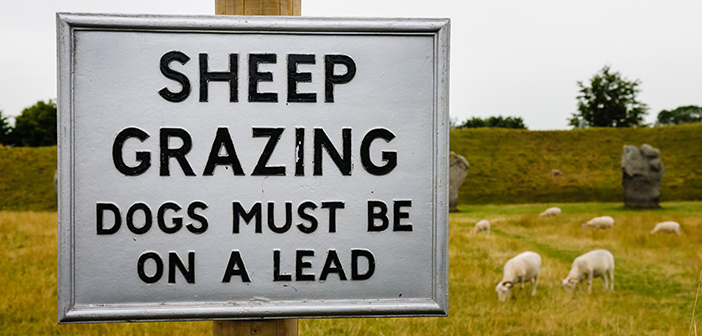Reported to be the most frequently occurring rural crime, attacks on sheep flocks by dogs, incidents known as ‘sheep worrying’, continue to plight farmers impacting animal health and welfare and farmers’ livelihoods and mental wellbeing.
Following a recent National Sheep Association (NSA) survey of rural police crime teams, the sheep farming charity has launched its annual sheep worrying by dogs awareness campaign revealing concerning findings that indicate cases continue to increase across the UK.
The campaign aims to highlight the severity of the issue, increasing awareness amongst dog owners of the importance of keeping their pets on a lead and under control whenever livestock might be nearby.
NSA has conducted an annual farmer survey on the topic for several years with results showing that attacks on livestock leaving animals at risk of miscarrying their young due to stress, injured or even dead, continue to rise.
These findings have been matched by those from the 2024 survey where 78% of rural crime teams reported an increase in dog attacks on sheep over recent years. 76% of the forces reported that they respond to sheep worrying by dog incidents at least once a month, with 33% of them dealing with incidents on a weekly basis.
Most police forces contributing to the survey (57%) stated that sheep worrying by dogs was their most frequently reported rural crime.
NSA chief executive Phil Stocker said: “The 2024 NSA sheep worrying by dogs survey has provided a useful insight to how rural crime teams are working to support farmers affected by attacks on their flocks.
“We know that cases continue to rise, however only a fraction of those do actually get reported to the police due to farmers believing there may be little this action can do, but NSA urges farmers to report ALL attacks as we continue to strive to reveal the true alarming level of this problem.
“Only then can we hope for much needed legislation to be brought about that punishes those responsible for these crimes appropriately and acts as a true deterrent to those who continue to ignore the recommendations to keep dogs on leads near livestock and to know where they are at all times.”
64% of police forces are represented in the 2024 survey. Of these, the majority claim to be confident in dealing with sheep worrying by dogs incidents. This positive news demonstrates further the need for farmers to continue to report and engage with their local rural crime teams.
Trends from the survey did however show that those who said they were not as confident in dealing with sheep worrying incidents were typically located in and around more urbanised areas, a location where cases can frequently happen due to the close vicinity of a large number of dog owning general public to farmers’ fields and common land. This highlights the need for more education and wider awareness raising.
The majority of police respondents identified that dogs being exercised off of a lead and a lack of responsibility and awareness of the consequences of dog attacks as the two main reasons for them being called to incidents of sheep worrying by dogs.
NSA’s work continues to emphasise that chasing by dogs can do serious damage to sheep. The stress of worrying by dogs can cause sheep to die and pregnant ewes to miscarry their lambs, and sheep fleeing from dogs are often killed or seriously injured by their panicked attempts to escape.
Dog bites can cause death in sheep or necessitate them being put down at a later date, or in less severe cases considerable veterinary bills and additional welfare issues. NSA has also previously identified that sheep worrying by dogs can cause serious damage to farmer mental wellbeing.
NSA project manager Nicola Noble said: “Whilst the 2024 NSA survey has confirmed the concerning rise in sheep worrying by dogs cases there are clearly positive steps being made by rural crime teams to engage with dog owners in an effort to raise awareness and reduce these serious, upsetting attacks.
“By working with the police and by using warning signs for dog owners when livestock are grazing in certain fields, were recognised as the best method of deterrence and can hopefully help farmers reduce the number of attacks on their animals.”


